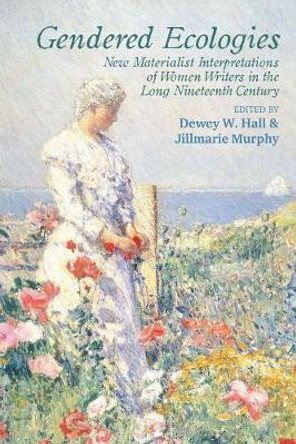Description
About the Author
Dewey W. Hall is Professor of English at California State Polytechnic University in Pomona. He is the author of Romantic Naturalists, Early Environmentalists: An Ecocritical Study, 1789-1912 (Routledge, 2014), featuring a discussion about literary origins behind the National Parks in America and National Trust in England. The work for the study was supported through a short-term fellowship at The Huntington Library. His second book Romantic Ecocriticism: Origins and Legacies (Lexington, 2016) examines science-based discourse in nineteenth-century literature and implications for contemporary culture. His third book Victorian Ecocriticism: The Politics of Place and Early Environmental Justice (Lexington, 2017) is an interdisciplinary edition, delving into the significance of place as represented by Victorian-era writers concerned about their environs. He has published in ELH, European Romantic Review, and The Coleridge Bulletin. He also belongs to an interdisciplinary research program, featuring Literature and Arts, as part of St. Catherine's College, Oxford. Jillmarie Murphy is a Professor of English and Director of the Gender, Sexuality, and Women's Studies Program at Union College, Schenectady, New York. Her research interests and publications employ the psycho-social paradigm of attachment theory, drawing on topics considering gender, race, class, and ethnicity and their relationship to human-to-human, human-to-place, and human-to-animal bonding in literature. She has several publications that engage archival research and provide a lens through which to consider the evolution of literary history. She has published three books: Hawthorne in His Own Time (University of Iowa Press, 2007), Monstrous Kinship: Realism and Attachment Theory in the 19th and Early 20th Century Novel (University of Delaware Press, 2011), and Attachment, Place, and Otherness in Nineteenth-Century American Literature: New Materialist Representations (Routledge, 2018). She is also a contributor to The Oxford Handbook of Early American Literature (2008) and Emerson in Context (2014).
Reviews
Reviews'A wonderful addition to the field of environmental humanities that will undoubtedly appeal to human geographers, social ecologists, literary scholars, and philosophers of science... The editors have gathered a scholarship that will forge fruitful bridges between literature and science and incite readers to revisit their favorite novels with new awareness and sensitivity that are very timely.'
Helene B. Ducros, EuropeNow
'A fresh and invigorating contribution to the field of environmental humanities... The 'diversity' of the collection allows for a picture to emerge here of the many, complex and fascinating engagements with natural history made by women writers during the long nineteenth century.'
Penny Bradshaw, Green Letters
'This collection is very impressive, offering insightful new readings of British and American women authors from the perspective of new materialism... these essays expand the conception of what constitutes scientific writing in the long nineteenth century and recognizes the contributions of these women writers for the first time.'
Ronald D. Morrison, Pacific Coast Philology
'Writing about nature and the environment is a growing area, paving the way for fruitful scholarly work on women's writing about the environment. The long nineteenth century is a conflicted and productive site for this examination: women's lives and work were, then as now, enmeshed in the confining ecosystem of a patriarchal culture which failed to take their work-both creative and scientific-seriously, and so it is promising to see books such as Dewey W. Hall and Jillmarie Murphy's Gendered Ecologies [...] breaking new ground. As the introduction makes clear, this collection of essays is intentionally diverse and pleasingly intersectional, negotiating complex boundaries not only across genders, but also between the human and nonhuman, and additionally between women's bodies and their material environments. In the process the essays offer some exciting new ways of reading women writers.'
Serena Trowbridge, Victorian Studies
'The essays in this collection consider the interrelationships between humans, nonhumans, objects, and environments... There is much to gain from this collection for literary researchers, ecocritics, and feminists... Gendered Ecologies provides an evocative look at the materiality and ecofeminist underpinnings of canonical and lesser-discussed texts written by women in the nineteenth century.'
Melinda Backer, Victorian Studies
'The essays in Gendered Ecologies explore an array of spaces, such as gardens, medieval towers, and ancient Greece, where readers will find exhumed skulls, chlorinated lime, and Charlotte Bronte's fern collection, among other entities... With its stirring, theoretically robust, and accessible analyses, this collection also illustrates the value of nineteenth-century women's writing to posthumanists, New Materialists, and ecocritics.' Abby L. Goode, Legacy
Book Information
ISBN 9781835538784
Author Dewey W. Hall
Format Paperback
Page Count 276
Imprint Liverpool University Press
Publisher Liverpool University Press




